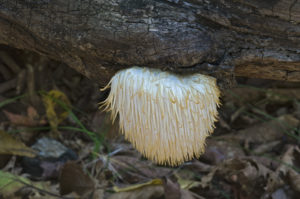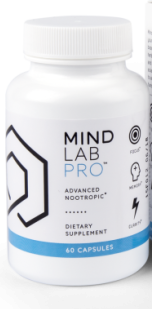Table of Contents
Lion’s Mane (Hericium erinaceus) is unique in the mushroom family both in appearance and function. Lion’s Mane Mushroom is extremely effective at stimulating Nerve Growth Factor (NGF) in the brain.
Known for its powerful effects as a “brain tonic”, Lion’s Mane is said to have been used as a tea for thousands of years by Buddhist monks. To enhance brain power, and heighten their ability to focus during meditation.
Lion’s Mane as a nootropic, is a powerful catalyst for brain cell regeneration helping improve memory and cognition.
The primary active compounds in Lion’s Mane are hericenones and erinacines. Erinacines help your brain produce more Nerve Growth Factor. Erinacines easily cross the blood-brain barrier to boost the production of neurons.
Lion’s Mane helps:
- Nerve Growth Factor. Lion’s Mane Mushroom prevents and treats nerve damage in the brain. Once past the blood-brain barrier, Lion’s Mane stimulates enzyme production that release Nerve Growth Factor (NGF). Nerve regeneration helps relieve neurodegenerative disease symptoms such as Alzheimer’s, dementia, and Parkinson’s Disease.
- Neurogenesis. Lion’s Mane stimulates the repair and creation of neurons. Boosting neurotransmitters and signaling that effects memory, learning, recall, and mood.
- Brain Optimization. Lion’s Mane helps eliminate brain fog. Restoring memory and mental alertness. And improves anxiety and depression symptoms.
Overview
Lion’s Mane (Hericium erinaceus) is a medicinal mushroom proven to benefit the brain, nerves and immune system.
Unlike other mushrooms sporting a cap and stem, Lion’s Mane has long, flowing, white tendrils. Resembling a lion’s mane. Other names include Monkey’s Head, Bearded Tooth, Pom Pom Blanc, Hedgehog Mushroom and Satyr’s Beard.

This parasitic fungus grows hanging off logs and trees. And is native to North American, Europe and Southeast Asia. In Japan, it’s called yamabushitake or “those who sleep in mountains”. Referring to the Shugendo sect of hermit monks and their long, flowing robes.
As a nootropic, Lion’s Mane has been shown to be particularly effective in stimulating Nerve Growth Factor (NGF) in the brain.
NGF is produced in the hippocampus throughout life. Modulating cholinergic receptors and neuroplasticity.[i] And is essential for learning.
Nerve Growth Factor are special proteins that function to regenerate neurons. Lion’s Mane contains two unique classes of NGF’s – hericenones and erinacines which easily cross the blood-brain barrier.
Lion’s Mane, like other medicinal mushrooms, contain high amounts of the antioxidant beta-glucoxylan and four other polysaccharides and polypeptides. Having a significant impact on enhancing your immune system. And decreasing tumor growth.
Lion’s Mane has also been studied in reducing amyloid plaques. These clumps of beta-amyloid proteins block signals between neurons. And are implicated in Alzheimer’s and other neurodegenerative diseases.
Lions’ Mane is also used to treat Lyme’s Disease, and digestive tract issues.
Here we’re talking about Lion’s Mane Mushroom and its effects on brain health and chemistry.
How does Lion’s Mane Work in the Brain?
Lion’s Mane boosts brain health and function in several ways. But two in particular stand out.
- Lion’s Mane Mushroom stimulates the synthesis of Nerve Growth Factor (NGF). NGF is a protein that plays a major role in the maintenance, survival and regeneration of neurons.
NGF is required by your brain to keep neurons strong and healthy. When various neurological disorders occur, your brain is unable to produce its own internal source of NGF.
In a study done in Kuala Lumpur in 2013, scientists showed that Lion’s Mane extract induced NGF synthesis and promoted neurite outgrowth.[ii]
- Lion’s Mane is effective in reducing anxiety and depression. Some even call it the “smart mushroom” for its ability to improve cognition, memory and work as an anti-depressant.
A study by researchers in Japan worked with 30 women. The female subjects had been complaining about menopause, depression, sleep quality and other issues.
The women randomly received Lion’s Mane-laced cookies or a placebo for 4 weeks. The researchers found that Lion’s Mane “has the possibility to reduce depression and anxiety, and these results suggest a different mechanism from NGF-enhancing action of H. erinaceus”. [iii]
How things go bad
Science once believed that the brain could not grow new brain cells. That once our brain developed during childhood, and we reached adulthood, we had all the brain cells we’d ever have.
Now we know that neurons can regenerate. But that doesn’t mean they will regenerate. A number of health issues can contribute to neurodegeneration.
↓ Decrease in Nerve Growth Factor = Decrease in Long-Term Potentiation affecting long-term memory[iv]
↓ Brain cells die and are not replaced
↓ Neuroplasticity declines resulting in poor memory
↓ Neurotransmitters decline resulting in anxiety, poor mood and depression
All of these age-related changes are contributing factors to neurodegenerative diseases like Alzheimer’s, Parkinson’s and others. And anxiety, depression and mood disorders that affect quality of life.
Lion’s Mane benefits
At least a dozen peer-reviewed studies have been published on Lion’s Mane benefits to brain health since 1991. Dr. Kawagishi of Japan was first to identify Nerve Growth Factor properties in Lion’s Mane Mushroom.[v]
In one double-blind, placebo-controlled trial, researchers in Japan worked with 50 – 80 year old men and women. All suffered from mild cognitive impairment.
The trial subjects received four 250 mg tablets containing 96% of Yamabushitake (Lion’s Mane) dry powder three times a day for 16 weeks. The men and women were tested at 4, 8, 12 and 16 weeks.
At each of the testing periods, the subjects who had used Lion’s Mane showed a significant improvement in cognitive scores. And their scores were increasing while on Lion’s Mane supplementation. But 4 weeks after stopping Lion’s mane supplementation, their cognitive scores decreased significantly.
The researchers concluded that Lion’s Mane Mushroom is effective in improving mild cognitive impairment.[vi]
How does Lion’s Mane feel?
You may not experience the effects of supplementing with Lion’s Mane Mushroom immediately. But many users report with continued use of Lion’s Mane, a boost in mood and mental energy.
 Some report it increases depth perception. And an improvement in sense of smell.
Some report it increases depth perception. And an improvement in sense of smell.
Others testify to improved decision-making, the ability to solve problems and learning. Likely due to Lion’s Mane ability to improve neuroplasticity.
The overall consensus is Lion’s Mane Mushroom’s ability to lessen anxiety, reduce depression, and improve concentration.
Lion’s Mane Clinical Research
Lion’s Mane Mushroom has been used as a food and herbal medicine since ancient times in East Asia. And it has been reported in scientific research that Lion’s Mane promotes Nerve Growth Factor both in the petri dish as well as in animal and human test subjects.
Lion’s Mane Prevents Cognitive Dysfunction
In this study, researchers examined the effects of Lion’s Mane on amyloid β(25-35) peptide-induced learning and memory deficits in mice. Amyloid β(25-35) peptide is implicated in diseases like Alzheimer’s.
Mice were injected with the peptide on days 7 and 14 of the trial. And they were fed a diet containing Lion’s Mane over 23-days of the experiment. The results showed that Lion’s Mane prevented short-term and visual recognition memory reduction normally induced by amyloid β(25-35) peptide.
They concluded that Lion’s Mane Mushroom “may be useful in the prevention of cognitive dysfunction”.[vii]
Lion’s Mane Induces Nerve Growth Factor
In this trial, mice were fed Lion’s Mane 5% freeze-dried powdered extract for 7 days. Researchers found an increase in the level of Nerve Growth Factor (NGF) in the hippocampus of the mice. Concluding that Lion’s Mane “contains active compounds that stimulate NGF synthesis”.[viii]
Lion’s Mane Repairs Nerves
In this study done with rats, Lion’s Mane extract was able to promote neuron regrowth after injury. Rats with gluteal nerve damage were able to walk again after consuming water containing Lion’s Mane extract.
The researchers concluded that Lion’s Mane regenerates damaged nerve cells. In this case, the reversal was so profound, the rats went from being totally disabled to walking again.[ix]
Lion’s Mane Dosage
Wondering how much Lion’s Mane to take? Dosing of Lion’s Mane Mushroom depends on the strength of the extract.
For Lion’s Mane 10:1 extract (30% polysaccharide), daily dosage is 500 – 1,000 mg taken 1 to 3 times per day. This means that if you choose a daily dose of 1,000 mg of Lion’s Mane extract, you should take 500 mg in the morning, and another 500 mg at noon.
Other retail extract dosage of Lion’s Mane ranges from 300 mg to 3000 mg dosed 1 – 3 times per day. Check the label and see what the manufacturer recommends. And when first using the supplement, start with the lowest dose and see how your body reacts.
Lion’s Mane Side Effects
Lion’s Mane Mushroom is non-toxic and considered very safe. So there are very few side effects reported.
Some neurohackers report itchy skin from higher doses. Likely attributable to a boost in Nerve Growth Factor.
Lion’s Mane has been tested in animals showing no side effects or toxicity even up to 5 grams per kilogram.
Best type of Lion’s Mane to buy
Lion’s Mane Mushroom (Hericium erinaceus) as a nootropic supplement is usually offered as an extract. In powdered form, or in a capsule.
 Lion’s Mane Mushroom can be found in some of higher quality pre-formulated nootropic stacks. For example, Click for Mind Lab Pro® contains 11 brain enhancing nootropic compounds including Lion’s Mane with the full fruit spectrum including hericenones and erinacines.
Lion’s Mane Mushroom can be found in some of higher quality pre-formulated nootropic stacks. For example, Click for Mind Lab Pro® contains 11 brain enhancing nootropic compounds including Lion’s Mane with the full fruit spectrum including hericenones and erinacines.
I recommend Mind Lab Pro® because it addresses all aspects of anxiety resistance, memory and cognitive enhancement, stabilizes mood, brain repair, and maintenance.
This premium nootropic stack is designed to affect neurotransmitters, cognitive energy, brain waves, neuroprotection, and regeneration. See my Mind Lab Pro review for a detailed report.
When choosing a Lion’s Mane supplement, there’s debate over the best form of extraction to achieve the mushroom’s full medicinal benefit. Some say your best option is a hot water extraction. Another says alcohol extraction. Another claims both are necessary.
But when it comes to mushrooms, saying that one is “more potent” than another is just too simplified to be true. This is as much an art as it is science.
Much more important is choosing a supplement that includes the mycelium of Lion’s Mane Mushroom. In this mushroom, the fruiting body does not contain erinacines which is the compound that boosts Nerve Growth Factor (NGF).
The nootropic benefits of hericenones only found in the fruiting body or top of the mushroom help support your immune system and get rid of Amyloid β(25-35) peptide implicated in diseases like Alzheimer’s.
The challenge is getting a Lion’s Mane Mushroom extract that contains the full spectrum found in both the mycelium and fruiting body. But the mushroom must be grown in liquid and not a solid substrate like grain. Otherwise you’ll get ground up grain without the important erinacines needed for increased NGF.
Look at the manufacturer’s literature and marketing material and find out how their Lion’s Mane is grown. And read the reviews on shopping sites as well as forums.
Types of Lion’s Mane available:
- Plain Lion’s Mane: Pure, powdered mushroom. Often freeze-dried, and the cheapest form available. Can be added to water, juice or smoothies.
- Lion’s Mane Extracts: A more potent form of mushroom. Often presented as 14:1 or 10:1 extracts (14 pounds or 10 pounds reduced to 1 pound of extract).
You will get 500 mg Lion’s Mane full spectrum extract in Click for Mind Lab Pro®
If you want a standalone Lion’s Mane Extract, I recommend Real Mushrooms organic Lion’s Mane Extract
- Standardized Lion’s Mane: Processed to provide exact levels of active ingredients. You can get Lion’s Mane standardized to 30% and 50% polysaccharides (including the active secondary metabolites hericenones and erinacines).
- Lion’s Mane tea: Since this is a popular mushroom in the kitchen, the taste is acceptable. But it’s hard to get a handle on how much actual active ingredient you’re getting.
- Amycenone®/PLM-Fraction: This “branded” product is standardized to Hericenones 0.5%, Amyloban 6%. It seems to target a lesser-known Lion’s Mane active ingredient–Amyloban–which is positioned as a mushroom compound that fights beta-amyloid proteins. Originating in Japan, it is extremely expensive, and may be found in a supplement called Amyloban®3399.
And if you decide to pick your own, before consuming any wild mushroom, make sure that it is accurately identified. Mushroom poisoning is a real problem if you pick the wrong one.
For a full list of Mycology societies that may be able to help you, go to the North American Mycological Association website (www.namyco.org).
Nootropics Expert Recommendation
Lion’s Mane 500 – 2,000 mg per day
 I recommend using Lion’s Mane as a nootropic supplement.
I recommend using Lion’s Mane as a nootropic supplement.
Your body does not make Lion’s Mane on its own. So you need to take it as a supplement.
Lion’s Mane is especially helpful for regenerating brain cells. It prevents neurodegenerative diseases like Alzheimer’s and Parkinson’s.
And it boosts long-term potentiation for memory and mental sharpness. By stimulating Nerve Growth Factor.
Lion’s Mane also helps boost mood, tame anxiety and relieve depression. For a better quality of life.
We suggest starting with a dose of 500 mg daily. The best human study used 3000 mg per day. But another researcher found lower concentrations may stimulate NGF better than higher concentrations.[x]
Start at 500 mg per day and see how it works for you. If you don’t experience a benefit, boost Lion’s Mane in small increments of 250 mg per day until you notice an improvement. And make sure you are using a supplement containing the mycelium and fruiting body that is grown in a liquid medium.
You can buy individual Lion’s Mane supplements. Or you could try my favorite pre-formulated nootropic stack Click for Mind Lab Pro® which includes the full spectrum including hericenones and erinacines found in Lion’s Mane Mushroom.
Mind Lab Pro contains a synergistic blend of 11 brain enhancing nootropics covering all aspects of cognition and brain health. See my full Mind Lab Pro review for more.
Lion’s Mane is a great compliment to a nootropic stack including Aniracetam, Alpha GPC and Omega-3’s for an immediate cognitive boost.








Join The Discussion - 408 comments
Sarah
July 6, 2018
Hi , I recently picked up a 50g packet of Lions mane powder at a health show. I have post concussion syndrome and have fatigue, and a whole load of other symptoms that show up when I’m over tired. Is this appropriate for pcs? the guy on the stall said it was but he was trying to sell it to me… I have had pcs since an accident 2 yrs ago, how long would I need to take it for before I start noticing any difference? The problem I find with all this stuff is the cost. I am on benefits as cant work because of pcs. I can’t currently afford to start having loads of this unless I am very sure it will help me. It feels like gambling! Thanks in advance for your advice, Sarah
David Tomen
July 6, 2018
Sarah, Lion’s Mane should be an ideal supplement for post concussion syndrome. Did you see my post for treating Traumatic Brain Injury here? https://nootropicsexpert.com/best-nootropics-for-traumatic-brain-injury/
I have tested and plan on doing a review for a nootropic stack called Neuro-Stack which provides 1,400 mg of Lion’s Mane per dose. If you are interested you may want to check out the reviews here: https://amzn.to/2KT5Orv
Debra
June 3, 2018
Omg, that Mind Lab Pro is too expensive for me so can you recommend another that will probably yield the same results for under $25. I killed my brain cells from all this stressing which in turn has cause me Adrenal Fatigue along w/Periomenopause for the past probably 5yrs. Doctors wanted to make me mentally insane but I knew it was not that and so glad I refused rx drugs. Im so glad I found this article and your wisdom.
Be Blessed
David Tomen
June 3, 2018
Debra, you can get started on brain cell repair by using Lion’s Mane. I just checked and found at least two options for under $25 from reputable vendors on Amazon. But my experience over the last 10 years is it’ll take far more than $25/mth. to repair a damaged brain.
Megan Luecke
October 20, 2018
Hi Debra,
In case this is still relevant – I had significant adrenal fatigue and thyroid problems. I followed the Stop the Thyroid Madness protocol and got better. (There’s a website – just google stop the thyroid madness.) You do need a doctor to prescribe some of the recommendations, and you do need to get some labs run, but I found it to be worth it. There’s also a facebook group called Adrenal Fatigue and Thyroid Care that is full of helpful people. I’m not trying to sell anything and I am not connected to the author of the website, I’m just sharing something that helped me.
Bob Porter
April 7, 2018
I have advanced CIDP with lots of nerve damage. Will lion’s mane helpregrow mylin and damaged nerves.
I’ve been taking 1 ml Host Defense 2X a day for one month. No change yet.
David Tomen
April 8, 2018
Bob, Lion’s Mane helps repair and generate new neurons. But not myelin. The only nootropics I’m aware of that have been shown to restore myelin are Sulbutiamine: https://nootropicsexpert.com/sulbutiamine/. And some of the B-Vitamins. Use the search function top right of this site and search for “myelin”.
You’ll have to read each search result carefully because some mention “myelin” but don’t actually help repair it.
Kevin L
July 15, 2019
I found one research paper that suggests Lion’s Mane might help repair myelin. I was bindge reasing about Lion’s Mane and found this paper. This research experiment shows that it helps cultured brain cells of mice to grow myelin faster. I don’t know what that translates to for humans. It might help though. https://pdfs.semanticscholar.org/14e2/7efb714718cc0262bf32b5adaaa75e68d729.pdf
David Tomen
July 16, 2019
Kevin, that’s a good find. Myelin is the sheathing surrounding each one of the axons in your brain. It’s a lot like electrical tape providing a protective sheath around electrical wire.
But recent research shows myelin does so much more including promoting better brain cell signaling. Which would have a positive effect on learning and memory, and cognition (quicker thinking).
justin rinehart
April 2, 2018
Hi David,
I enjoyed your video on Lion’s Mane Mushroom, This is a nootropic I have heard of before but just thought I would give it a try but upon looking for chemical named you mentioned, I was unable to find anything similar and found different brands have different ingredients.
So I am dumbfounded what will be the best quality to optimize my brain. As you said 1-10 20% (a chemical name I can’t pronounce nor spell ) I could not find anything similar on any labels.
one product’s label was this:ORGANIC FERMENTED LION’S MANE MUSHROOM – (HERICIUM ERINACEUS)(MYCELLIUM/ORGANIC WHOLE OAT BIOMASS)
1,000 Mg
Another looked like this:LION’S MANE FRUITING BODY EXTRACT BLEND – (HERICIUM ERINACEUS)
1,000 Mg
N/A*
MAITAKE FRUITING BODY STANDARDIZED EXTRACT, TD-FRACTION
100 Mg
And the others looked different as well.
What should I be looking for, Are the mentioned above decent quality?
Thanks for your feedback, Your channel is extremely informative and well researched, When I ask my Doctor or any dr about supplements they are quick today they can not comment as they are not FDA approved = They don’t pay me so I will not recommend them.
I know how much research goes into tour work and if you ever start a patreon page please link it in your videos as I would love to keep this channel going and expand into other areas of nutrition and supplementation.
I read a lot myself but as you know you will read one article about a supplement or food that raves about its benefits only to read another that list nothing but negatives.
That is why I would love to see you expand on that, I hope I am not rambling, I just want to be a supporter of the channel.
I bring this up because of as I am a daily eater on Tofu, I have read some articles that eating Tofu leads to memory loss, even dementia- I don’t know how much proof there is to that if any so I got concerned as I consume a lot of it daily.
Thanks for the informative videos!
David Tomen
April 2, 2018
Justin, I will be publishing a “where to buy” post in the next couple of months. So stay tuned …
Meanwhile, I’m not familiar with the products you mentioned in your comment. And the thing is no one has a definitive claim to having the most effective Lion’s Mane. At the moment the best I can suggest is read the “Available Forms” section of this post. Then compare the “Types of Lion’s Mane Available” bullet list (the first three bullets) with label descriptions on the supplement bottles you are considering.
Once you’ve narrowed down your list of 2 -3 Lion’s Mane supplements then read the reviews for each closely. I realize this is a very ‘unscientific’ method of selecting a supplement. But the bottom-line is we want something that works. Reviewers are often the best source of that information.
rashed
March 1, 2018
Hi David, i just wanna thank you for this amazing website and the wonderful book you gave us, thank u.
thou i need some clarifications on some supplements that i’m currently using to heal and repair my brain;
i’ve ben using bacopa monnieri (brand: nature’s answer) one capsule with breakfast and lion’s mane (brand: Host defense) 2 capsules after breakfast, and my main daily supplements are also b vitamins and Mega-DHA and these 2 i’ve been using for the last year and i felt good on them but this last month and a half i introduced the bacopa and lion’s mane which they had a total diverse effects on which i’m taking them for, i lack concentration and i feel a little bit depressed and sedative all day, no energy and my brain is fogy AND i lack motivation, and i’m afraid if i keep using them it will get worst, that’s why i need you expert opinion, should i discontinue using them or is it just the way the brain heals and i just have to stick with it till this period passes , i really don’t know what to do and i really have classes and a very demanding job which requires me to be sharp minded and productive all the time,
i’m looking forward to hear your advice and thank you so much,
oh, and also i sue magnesium at night only 150mg cause i eat a lot of food containing magnesium, thank you again
David Tomen
March 1, 2018
Rashed, it could be Bacopa that is causing your problems. Try eliminating Bacopa for 2 – 3 days and see what happens. If there is no change then eliminate Lion’s Mane and see if you experience an improvement.
Are there any other ingredients included in either supplement you are using? Or are they both plain extracts?
One thing I’ve learned over and over again is not every supplement is right for everyone. Each of us is unique. And how we respond to various supplements.
ronen
October 26, 2017
Hi,
thanks for all the useful info and research!
Any brands that you recommend and trust for effective lion’s mane supplements?
i’m a bit overwhelmed by the options and the many contradicting reviews.
thanks!
David Tomen
October 26, 2017
Ronen, great question and this is an ongoing issue with finding quality supplements. Please see the article I wrote recently on choosing quality supplements here > https://nootropicsexpert.com/7-tips-for-choosing-the-highest-quality-nootropic-supplements/. I know the Lion’s Mane Mushroom in Mind Lab Pro has been verified and guaranteed.
You can try a search for “Lion’s Mane Mushroom” AND “USP Verified” and see what turns up in your part of the world.
First look for “USP Verified” or “NSF International” on the label. And “Certified USDA Organic”. Some supplement manufacturers like Swanson Vitamins do in-house and third party testing. Then put their own seal “guaranteeing” that what’s advertised is actually in the bottle.
Finally, after you find a winning contender check out the customer reviews and see if verified buyers agree to the company claims of potency.
anonymous
June 3, 2017
There is a mistake in the article
Instead of
“The best human study used 750 mg per day.”
Should be:
“The best human study used 3000 mg per day.”
Because, as is written earlier in the article: “The trial subjects received _ _ _ four _ _ _ 250 mg tablets containing 96% of Yamabushitake (Lion’s Mane) dry powder three times a day for 16 weeks.”
250 x 4 x 3 = 3000 /day
David Tomen
June 4, 2017
Your are absolutely right. My mistake. Math was never one of my strong subjects in school. Much appreciated and it has been changed.
Peter J Duquemin
February 22, 2017
I had been inline speed skating to strengthen my legs and ankles for tennis for several years on skates that were too tight. This was at age 55. As a result I developed compression neuropathy on both feet after a few hundred hours of skating. The pain became very intense and I tried everything but nothing seemed to work so I did some research and discovered Lion’s Mane. Since I fully understand the potential of mushrooms to do some amazing things(FSU 77 LOL), I was confident it would help somewhat. I ordered it along with Super B’s and after 6 weeks or so, both feet were 80-90% back to normal. There is no more pain!!! That was 3 years ago and I have taken a two month dose twice since then. At 62 I am almost as quick as ever and I am quite fast around a tennis court so am looking to play another National Tournament soon. I have not taken a new IQ test lately but am sure it might have raised it even a few more points. After all, growing a few more neurons in the brain is a good thing.
David Tomen
February 22, 2017
Thanks Peter for sharing your experience with Lion’s Mane and the B-Vitamins. I’ve had amazing success in turning around my health using nootropic supplements. And why I started Nootropics Expert. It’s always gratifying to hear from someone who shares some of the benefits that I’ve experienced.
John
May 13, 2019
Are there an concerns with substantial doses of b-1 50-100 mg and lions mane 500mg?
David Tomen
May 14, 2019
John, not the I’m aware of. Please let me know if you’ve found something to the contrary.
Colin Scotts
October 22, 2018
Im confused how much Lions Mane do I take.
I have it in powder form would 2 teaspoons a day work.
No directions on pack can someone please help Im so keen to use.
David Tomen
October 23, 2018
Colin, check the manufacturer’s website and see if they have dosage instructions for their Lion’s Mane. You can safely use up to 3 grams per day. But you may want to get yourself a small scale to weigh it.